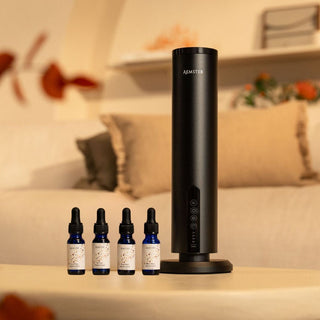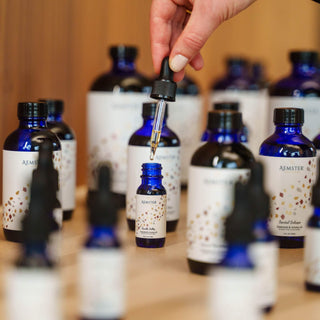The power of scent
At aemster we believe in the power of scent
And not only do we believe in that power, but scientific research also shows how the sense of smell has a powerful impact on people's state of mind.
The most powerful sense we have
Our sense of smell is the only sense that is directly and without intervention connected to our memory and the emotional center in our brain (Mitchell et al., 1995; Lindstrom, 2005).
For that reason, it is simply impossible to switch off our sense of smell, and this results in something called pre-attentive processing. This means that before we are even aware of it, we smell an odor and we react to this odor without even having to think about it. The difference with our other senses is that everything that we smell, is processed directly in the amygdala and therefore immediately evokes emotion and memory. This is in contrast to our other senses, which have to process the stimuli first before we get a response from our brain.
As an example, we can choose not to see or hear a song or a commercial, but we cannot choose not to smell a scent. This makes scent a powerful tool that can lift or break your marketing.
A few facts
- The smell is stored in the olfactory memory, where we can also find our memories and emotions.
- The smell makes a direct connection to memory and emotion and creates an instant state of mind.
- It transports your thoughts to the time and place where you first smelt the fragrance.
"Sometimes I smell the scent of an open fire, and I immediately imagine myself 35 years back in time to the wonderful winter I spent with my grandmother on Mallorca. Says founder Rob Hoogerwerf".
A life full of scents
Whether we are aware of it or not, our whole life is filled with smells. Smells that make our lives more pleasant, smells that warn us, smells that trigger our memory smells that make us hungry, smells that arouse erotic feelings, delicious smells, bad smells, smells that we no longer even realize because they are fully integrated into everyday life. Smells that have become as natural as the light of day and the dark of night. Without a functioning sense of smell, life would be very different. Although many will find it more tragic not to be able to see or hear. That is certainly not unjustified, but the lack of a sense of smell, which exists, should not be underestimated. After all, odors not only greatly enhance our daily lives, but they also play a role in our hygiene. The smell of everything we eat and drink is at least as important as its taste. In addition, our nose can warn of danger from, for example, spoiled food or fire. The fact that our nose is an important part of our body is also shown by the countless expressions, sayings, and proverbs that appear in almost all languages. Such as:
He who violates his nose violates his face
Sticking your nose into other people's business
Hold your nose at something
Poking someone through the nose
Having a good nose
Not looking beyond the end of the nose
Hanging something on your nose
See something through someone's nose
Saying something through your nose
The cream of the crop
Getting it right in the face
It goes by the nose
Getting something out of someone's nose
Hold someone's nose
Take someone by the nose
Pretend that your nose is bleeding
Rubbing someone's nose
Everyone's nose is not a coat rack
The smell in everyday life
A wisecracking nose
Stink for a change
There is a smell to it
The appearance of the nose also attracts great interest, both positive and negative.
A cute little nose, a beautiful Greek nose, a large nose full of character, an aristocratic nose, and a hideous nose (Cyrano de Bergerac!). All forms have been described extensively in the literature, sung about lyrically in poems, and immortalized - skilfully or not - in portraits throughout the centuries. I found an astute riddle on the subject of the nose in a German publication:
Sie hat zwei Flügel und kann nicht fliegen,
Sie hat einen Rücken und kann nicht liegen
Sie hat in Bein und kann nicht stehen,
Sie kann laufen aber nicht gehen,
Sie trägt die Brille und kann nicht sehen.
Translation:
She has two wings and cannot fly,
She has a back and cannot lie down,
She has one leg and cannot stand,
She can walk but cannot go,
She wears glasses and cannot see
Fragrances in advertising
The fact that smells can have an extremely suggestive effect is put to good use in advertising. In recent years there have been experiments with fragrant advertisements. For instance, an ad for margarine smelling of butter, and an ad for fire insurance smelling of fire. Even films were shown with smells that were related to the content being shown, but the problem was that the smells lingered longer than the image.
In the past, there was an advertising firm that produced a leaflet: "The age of scent is at hand". It contains information about the so-called plus propositions. The possibilities of supporting advertisements strikingly and effectively by, for example, "Scratch and Sniff". A scent that can be applied to an advertising page in almost any desired scent.
Nowadays there are scents of, for example, a Mercedes available, with which the interiors of lesser cars are sprayed. And wonderful fragrance oils with that mixture of smells that is typical for a brand new car: Boiled paint, tectyl, new upholstery. That is what used cars are treated with! There are unlimited possibilities and it is also not unusual to perfume pets. The pet shops have special cat and dog perfumes for that purpose, of course, but that does not stop many women from spraying their precious perfume behind their darlings' ears. These are the women who polish the nails of their poodles and have coats made for their adored dogs from the same fabric they wear themselves. The legendary Elizabeth Arden, who left her native Canada for America at the beginning of the last century and set up her first beauty salon there, is known to have had her famous racehorses rubbed with her Ardena Skin Tonic. She did not like the smell of the usual horse creams.
Disguising odor
When buying cosmetics, one pays attention to their smell. Whether it is cream, bath foam, deodorant, or shampoo. The cosmetics industry has been responding strongly to the growing need for luxury over the past few decades. In most bathrooms, the ordinary bar of soap has long since made way for bath foam and shower gel, which are strongly perfumed and retain their scent for a long time. The latter cannot be said of many soaps, even the more expensive ones. Some deodorants have such a heavy scent that it does not always combine with the perfume you want to use. Not to worry, says the industry, we include a deodorant in the "bath line" so that everything has the same scent.
This is often designed so attractively that the products become a true ornament for the bath and the bedroom.
In the household, too, the industry conjures up fragrances. After the Second World War, we witnessed the entrance of air fresheners: In a spray can for the toilet, in a solid form for the cupboards. Detergents and softeners are "scented" with extraordinary care so that the laundry is not only clean and soft but also "smells nice and fresh". Waxes and furniture polishes are scented, and rubber and plastic articles are treated intensively. For the latter, the basic ingredients have a pronounced unpleasant odor, which must be eliminated. This applies to many other articles and products, by the way.
Odors that warn
When preparing food for freezing or canning, odors play a major role. Manufacturers can see, but also smell, whether the ingredients supplied are fresh and suitable for the process to be used. If something were to go wrong during the process, in most cases you would smell it immediately. EIMERT TEEKENS, at the time the largest butcher in the Netherlands and founder of de Vleesmeesters at the time, said: "Smell is, of course, a precursor to taste. That is why scents are so important in my profession, especially in the refinement of products. If you have a smokehouse with sausages or hams that have just been cooked, or with salted meat and liverwurst whose raw materials have been pre-cooked, then the result is an odor that you can smell of quality. If there is anything not quite right, or if any of the parts have been treated badly, I would smell it immediately."
The once culinary writer TON VAN ES, who was also an excellent cook, could talk for hours about smells in his field. He attached great importance to what were for others insignificant details because in his opinion it was precisely the combination of taste, smell, and presentation that led to the appreciation of a good table. "In my opinion, the smell is a bit underestimated in gastronomy. When I make an effort to bring home the smells and also try to define certain smells with wine tasters, I sometimes get a laugh from people who say: 'As long as it tastes good, then you don't have to make such an effort for me'. "I don't agree with that at all. I also think it's nice that some people are much more sensitive to certain smells than others. As far as that's concerned, I have a dairy tick. In other words, I am much more sensitive than others to milk turning sour or cream curdling.
In this connection, he once told of his visit to a dairy factory. As soon as he entered, he smelt something rotten, but his remark was indignantly rejected. The further the tour went on, the stronger the bad smell became. When the group finally came to a gigantic tank, he could not stand it any longer. The tank was opened at his request and it turned out that it had been forgotten in the production process. The contents were completely rotten. The fact that he had smelled these hundreds of meters earlier at the entrance was, of course, a big surprise. Ton van Es: "It must be something like absolute hearing in music. But I only have it with dairy products. From both stories by food experts, it becomes clear that smells can not only make us want to eat good food but can also prevent us from consuming tainted food.






